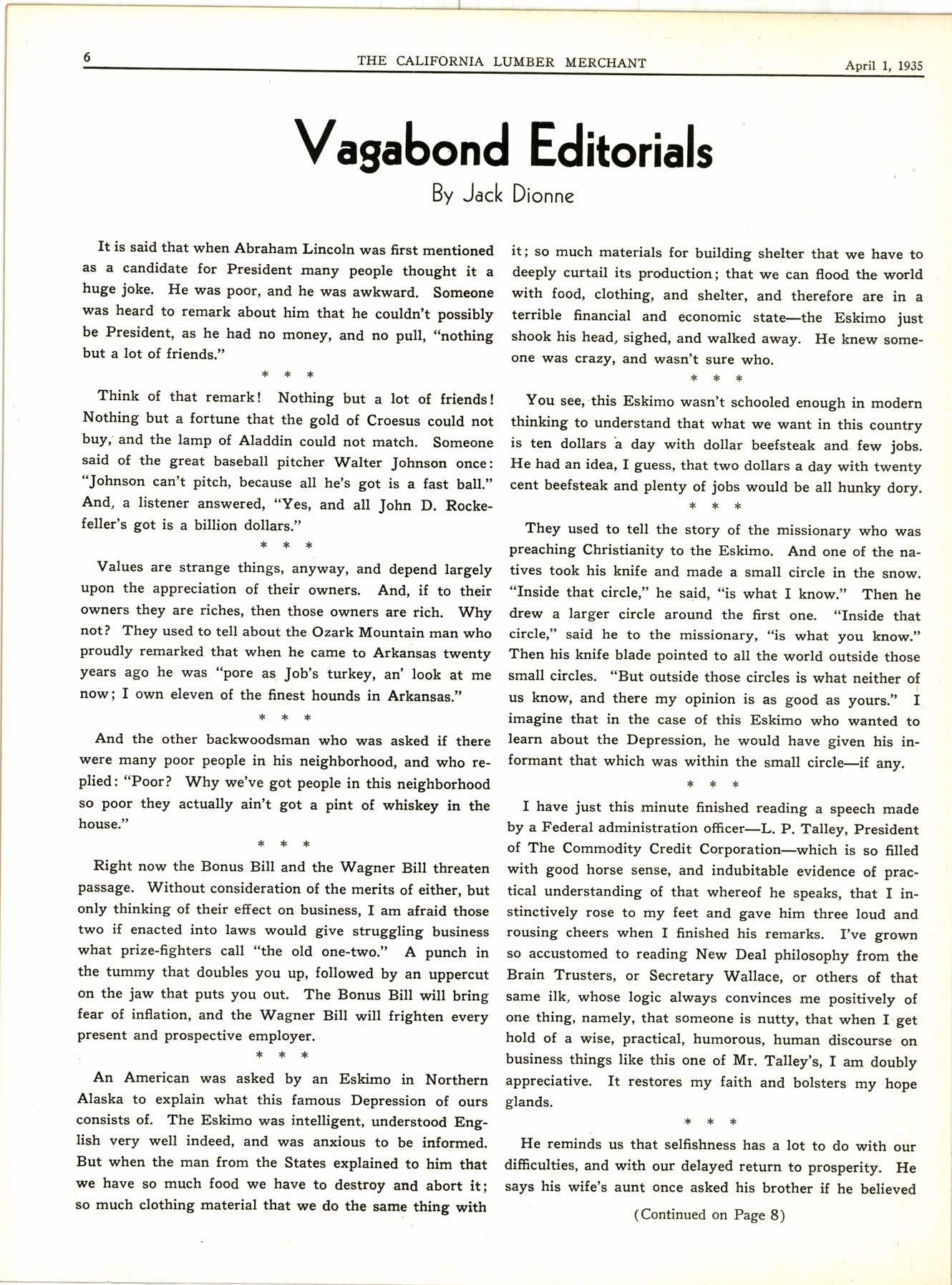
3 minute read
V.gabond Editorials
By Jack Dionne
It is said that when Abraham Lincoln was first mentioned as a candidate for President ,many people thought it a huge joke. He was poor, and he was awkward. Someone was heard to remark about him that he couldn't possibly be President, as he had no money, and no pull, ,,nothing but a lot of friends."
rFrF*
Think of that remark ! Nothing but a lot of friends ! Nothing but a fortune that the gold of Croesus could not buy,'and the lamp of Aladdin could not match. Someone said of the great baseball pitcher Walter Johnson once: "Johnson can't pitch, because all he's got is a fast ball.,' And, a listener answered, "Yes, and all John D. Rockefeller's got is a billion dollars." ***
Values are strange things, anyway, and depend largely upon the appreciation of their owners. And, if to their owners they are riches, then those owners are rich. Why not? They used to tell about the Ozark Mountain man who proudly remarked that when he came to Arkansas twenty years ago he was "pore as Job's turkeyt ?n' look at me now; I own eleven of the finest hounds in Arkansas."
And the other backwr.U"-"" who was asked if there were many poor people in his neighborhood, and who replied: "Poor? Why we've got people in this neighborhood so poor they actually ain't got a pint of whiskey in the house."
Right now the Bonus Bill and the Wagner Bill threaten passage. Without consideration of the merits of either, but only thinking of their effect on business, I am afraid those two if enacted into laws would give struggling business what prize-fighters call "the old one-two." A punch in the tummy that doubles you up, followed by an uppercut on the jaw that puts you out. The Bonus Bill will bring fear of inflation, and the Wagner Bill will frighten every present and prospective employer. ***
An American was asked by an Eskirno in Northern Alaska to explain what this famous Depression of ours consists of. The Eskimo was intelligent, understood English very well indeed, and was anxious to be informed. But when the man from the States explained to him that we have so much food we have to destroy and abort it; so much clothing rnaterial that we do the same thing with it; so much materials for building shelter that we have to deeply curtail its production,; that we can flood the wodd with food, clothing, and shelter, and therefore are in a terrible financial and economic state-the Eskimo just shook his head, sighed, and walked away. He knew someone was ctazy, and wasn't sure who.
You see, this Eskimo wasn't schooled enough in modern thinking to understand that what we want in this country is ten dollars 'a day with dollar beefsteak and few jobs. He had an idea, I guess, that two dollars a day with twenty cent beefsteak and plenty of jobs would be all hunky dory.
They used to tell the story of the missionary who was preaching Christianity to the Eskirno. And one of the natives took his knife and made a small circle in the snow. "Inside that circle," he said, "is what I know.,' Then he drew a larger circle around the first one. .,Inside that circle," said he to the missionary, "is what you know.,, Then his knife blade pointed to all the world outside those small circles. "But outside those circles is what neither of us know, and there my opinion is as good as yours.', i imagine that in the case of this Eskimo who wanted to learn about the Depression, he would have given his informant that which was within the small circle-if any.
I have just this minute finished reading a speech made by a Federal administration officer-L. P. Talley, president of The Commodity Credit Corporation-which is so filled with good horse sense, and indubitable evidence of practical understanding of that whereof he speaks, that I instinctively rose to my feet and gave him three loud and rousing cheers when I finished his remarks. I've grown so accustomed to reading New Deal philosophy from the Brain Trusters, or Secretary Wallace, or others of that same ilk, whose logic always convinces rne positively of one thing, namely, that someone is nutty, that when f .get hold of a wise, practical, humorous, human discourse on business things like this one of Mr. Talley's, I am doubly appreciative. It restores my faith and bolsters my hope glands.
He reminds us that selfishness has a lot to do with our difficulties, and with our delayed return to prosperity. He says his wife's aunt once asked his brother if he believed
(Continued on Page 8)











